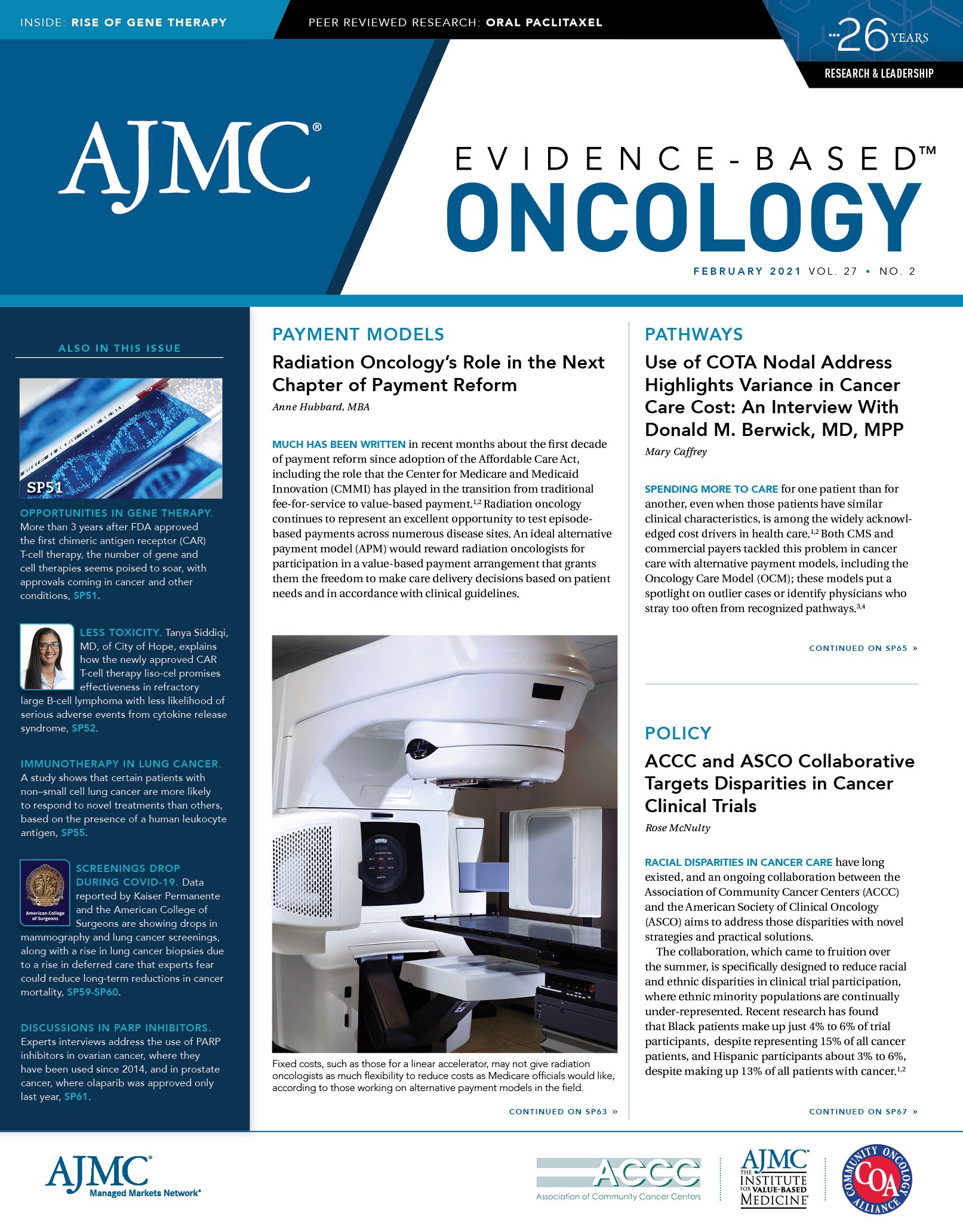- Center on Health Equity & Access
- Clinical
- Health Care Cost
- Health Care Delivery
- Insurance
- Policy
- Technology
- Value-Based Care
Certain NSCLC Patients Are More Likely to Respond to Immunotherapy, Study Results Show
A recent study investigated what makes some non-small cell lung cancer patients with a type of human leukocyte antigen (HLA) called B44 are more likely than others to respond to immunotherapy.
Immunotherapy can be an important tool in cancer treatment, but as with most therapies, its effectiveness varies between patients for reasons that are not always clear. When it comes to non–small cell lung cancer (NSCLC), a study published in Nature investigated why NSCLC patients with a type of human leukocyte antigen (HLA) called B44 were not more likely to respond to immunotherapy compared with patients lacking HLA-B44, when the opposite is generally true in melanoma.1
About half of the population has HLA-B44, and those people typically do well on immunotherapy for melanoma. But researchers at the UCLA Jonsson Comprehensive Cancer Center noticed that the same did not hold true in NSCLC, prompting them to investigate the mechanisms leading to the surprising finding. They chose B44 over other HLA-B supertypes because of its common occurrence, which allows for larger cohorts and therefore more statistically significant conclusions.
"Usually you would think that for 2 types of cancers that generally respond well to immunotherapy, there would be similar principles in terms of characteristics of patients who benefit, but that's not the case in this instance,” Amy Cummings, MD, clinical instructor of hematology/oncology at the David Geffen School of Medicine at UCLA and member of the Jonsson Cancer Center, said in a press release.2
Researchers aimed to build on a previous study of that found HLA-B44 presence did not benefit NSCLC patients the way it did in melanoma patients. The new study analyzed a group of patients treated with pembrolizumab with more than 5 years of follow-up and available tissue samples to get more data on the connection between HLA-B44 and immunotherapy outcomes.
To find out why patients with HLA-B44 have varied responses to immunotherapy in NSCLC versus melanoma, researchers also evaluated the mechanisms behind the different responses and validated the findings in publicly available NSCLC and melanoma cohorts.
When they performed whole-exome sequencing on melanoma and NSCLC tumors and blood samples, they found that different responses to immunotherapy were associated with the different mutations commonly found in each type of cancer. The presence of somatic mutations that lead to negatively charged glutamic acid anchors were indicators that NSCLC patients would see immunotherapy benefits similar to those seen in melanoma.
They analyzed treatment outcomes based on the neoepitopes, or peptides that the immune system recognizes as abnormal and targets with T cells, generated by the mutations. They predicted which neoepitopes would most effectively bind to HLA-B44 and be recognized by the immune system, then assessed treatment outcomes, including survival. They found that only NSCLC patients who had similar neoepitopes to melanoma patients were significantly responsive to immunotherapy.
When NSCLC patients did have HLA-B44 and the melanoma-like neoepitopes, their responses were typically durable, lasting for years in some cases. That information could help researchers running clinical trials stratify patients in terms of how likely they are to respond to immunotherapy, Cummings said.
“Our analyses offer an opportunity to move beyond histologic associations toward mechanism-informed prognostic markers for patient stratification: while B44, on average, is not predictive of ICB response in NSCLC, it may be for patients with NSCLC who exhibit favorable B44 neoepitopes with the converse true for patients with B44 melanoma without favorable B44 neoepitopes,” the authors wrote.
Authors noted that follow-up length varied and the study size (65 participants) was limited, but they concluded that the presence of certain neoepitopes does suggest immune tolerance and immunotherapy outcomes, which might explain the inconsistencies previously seen in immunotherapy response in patients with HLA-B44.
“From the time that we discovered the contradictory outcomes in HLA-B44 patients with melanoma and non-small cell lung cancer, we became fascinated by the mechanism that could explain this,” senior author Edward Garon, MD, MS, professor of hematology/oncology and director of the signal transduction and therapeutics program at the Jonsson Cancer Center, said in a statement. “While seeking this explanation, we gained important insight into how the immune system identifies tumors. We hope to eventually harness these findings to design therapies that can further enhance the immune response against tumors in specific patients.”
References
1. Cummings AL, Gukasyan J, Lu HY, et al. Mutational landscape influences immunotherapy outcomes among patients with non-small-cell lung cancer with human leukocyte antigen supertype B44. Nature. Published online November 16, 2020. Accessed December 2, 2020. doi: 10.1038/s43018-020-00140-1
2. Study identifies patients with lung cancer most likely to respond to immunotherapy. News release. UCLA Johnsson Comprehensive Cancer Center; November 16, 2020. Accessed December 2, 2020. https://cancer.ucla.edu/Home/Components/News/News/1590/1631

Insufficient Data, Disparities Plague Lung Cancer Risk Factor Documentation
September 24th 2023On this episode of Managed Care Cast, we speak with the senior author of a study published in the September 2023 issue of The American Journal of Managed Care® on the importance of adequate and effective lung cancer risk factor documentation to determine a patient's eligibility for screening.
Listen
